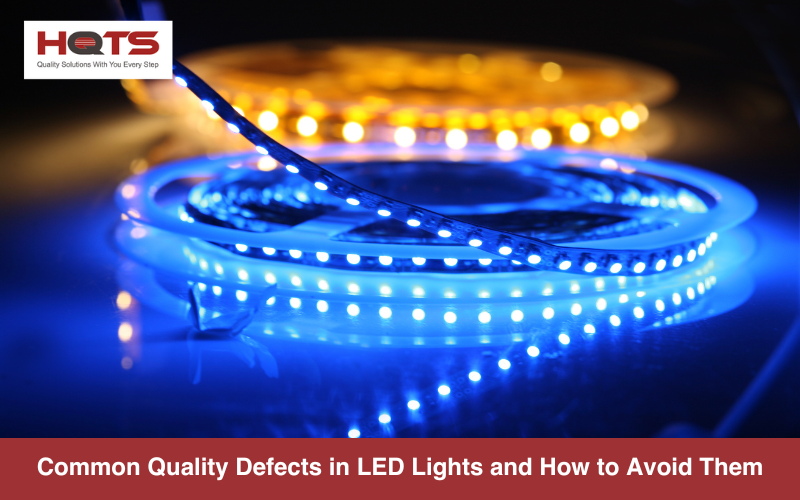LED (Light Emitting Diode) lighting technology has revolutionized the way we illuminate our homes, offices, and public spaces. With their energy efficiency, long lifespan, and environmental benefits, LED lights have become the preferred choice for both residential and commercial lighting.
In 2022, the global LED lighting market reached a significant value of USD 78.24 billion. Looking ahead, this market is projected to increase from USD 87.10 billion in 2023 to a staggering USD 298.38 billion by 2030.
Common Quality Defects in LED Lights
With more and more governments, consumers and industries adopting LED lighting for their operations, the importance of quality becomes increasingly evident as not all LED lights are created equal, and some may suffer from quality defects that can compromise their performance and longevity. In this article, we will explore common quality defects in LED lights and provide insights on how to detect them.
Flickering Lights
Flickering LED lights can be annoying and potentially harmful to your eyes. This defect is often caused by a poor-quality LED driver or power supply. When the voltage fluctuates or the driver can’t maintain a stable current, the LEDs may flicker. To detect this defect, observe the light closely, and if it exhibits irregular pulsing or flickering, it may indicate a problem.
Color Inconsistency
High-quality LEDs should produce consistent and accurate colors. However, some LED lights may suffer from color inconsistency, resulting in uneven or mismatched lighting. You can detect this defect by comparing the color of light from different LED bulbs or fixtures. If you notice variations in color temperature or hue, it’s likely a quality issue.
Dimming Problems
Many LED lights are designed to be dimmable, but not all of them perform well in this aspect. Dimming issues can include flickering, a limited dimming range, or uneven dimming. To check for dimming problems, install the LED light on a compatible dimmer switch and test its performance at various dimming levels.
Buzzing Noise
Typically, this occurs due to an overload within the circuit. If your LED bulb experiences a slightly elevated voltage, it won’t simply burn out; instead, it may emit a faint humming noise. As the voltage increases, the electronic components start to vibrate, resulting in the distinctive buzzing sound.
Heat Management
Overheating is a significant concern for LED lights, as excessive heat can shorten their lifespan and lead to premature failure. Poorly designed heat sinks or inadequate thermal management can result in LED lights that become excessively hot during operation. To detect this issue, touch the LED fixture after it has been running for a while. If it feels extremely hot to the touch, it may have heat management problems.
Lumen Depreciation
LED lights are known for their long lifespan, but their brightness can degrade over time. A noticeable decrease in brightness shortly after installation indicates lumen depreciation. To detect this defect, compare the initial brightness of the LED light with its current output. If there’s a significant drop, it may be a quality issue.
Flickering at Low Temperatures
Some LED lights may flicker or have delayed startup when used in cold environments. This defect is more common in low-quality LEDs with inadequate temperature compensation mechanisms. To test for this defect, place the LED light in a cold environment and observe its behavior during startup.
How to Detect Quality Defects in LED Lights
AQM BD Inspector will perform the next quality check points that are essential for a thorough assessment of LED lights, helping to identify internal issues, electrical stability, and light quality
- Internal Wiring and Connections: AQM BD will inspect the internal wiring and connections within the LED light. Loose or poorly connected wires can lead to performance issues and safety concerns.
- Voltage check: During the inspection we will measure the voltage stability of the LED light during operation. Fluctuations in voltage can lead to flickering or premature failure. Ensure that the LED light operates within the specified voltage range.
- Overcharge Check (if applicable): For LED lights with rechargeable batteries, AQM BD will check if they have overcharge protection mechanisms in place. Overcharging can reduce battery lifespan and pose safety risks.
- Luminosity and Brightness: AQM BD inspector will measure the luminosity and brightness of the LED light. Ensure it meets the specified lumen output and maintains consistent brightness without flickering.
- Color Temperature: We will Verify that the LED light emits light at the correct color temperature, adhering to the manufacturer’s specifications.
- Dimming Performance: During the inspection AQM BD will test the LED light’s dimming capabilities, if applicable. Ensure smooth and flicker-free dimming across the entire range.
- Color Consistency: AQM BD Inspector will check for color consistency across multiple LED lights of the same model. Variations in color temperature or hue can indicate quality defects.
- Flickering Test: Our inspector will observe that the LED light for any flickering or pulsing during operation, especially at different dimming levels and temperatures.
- Certifications: AQM BD will verify that LED lights that are certified by reputable organizations like ENERGY STAR, UL, or CE.
- Inspect the Packaging: AQM BD will examine the packaging for information about the manufacturer, specifications, and warranty. Legitimate manufacturers often provide detailed product information and offer warranties for their LED lights.
In conclusion, while LED lighting technology offers numerous advantages, it’s essential to be aware of common quality defects that can affect LED lights. By knowing what to look for and how to detect these defects, you can make informed decisions when purchasing LED lights for your home or business. Contact AQM BD today to ensure you LED products meet the quality standards you deserve.





